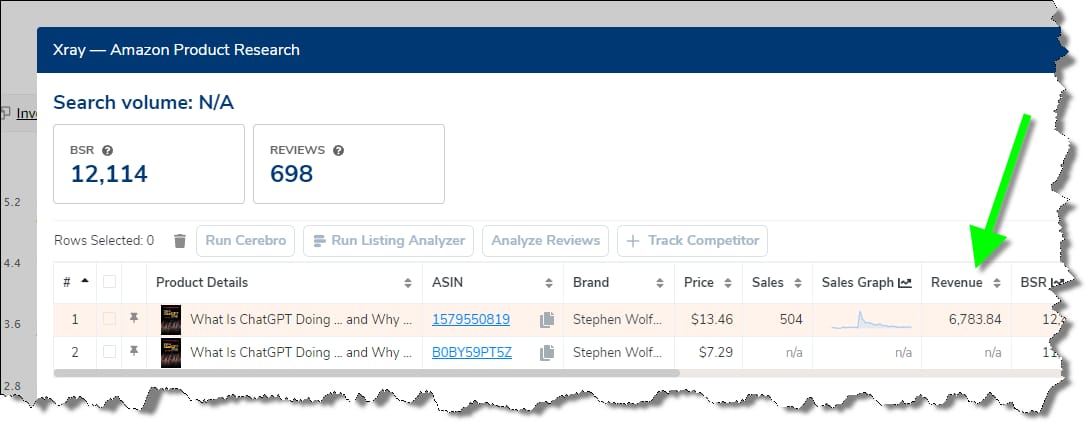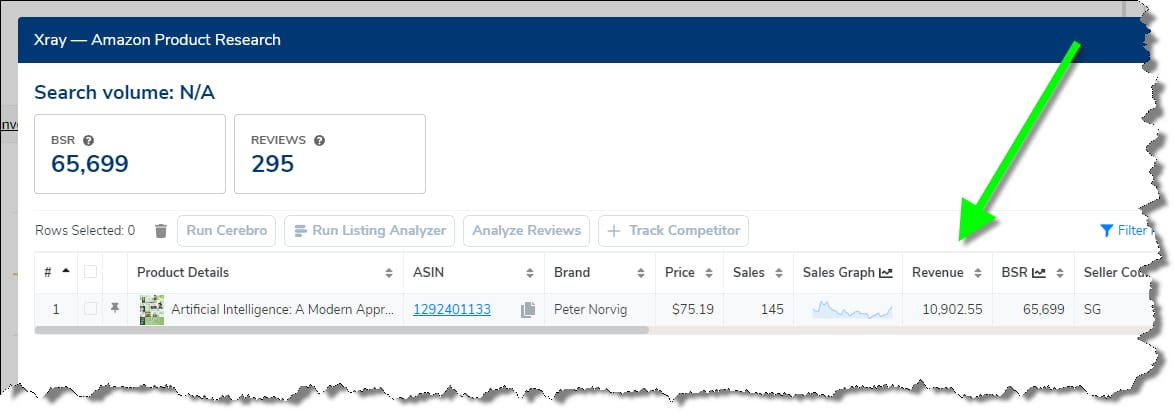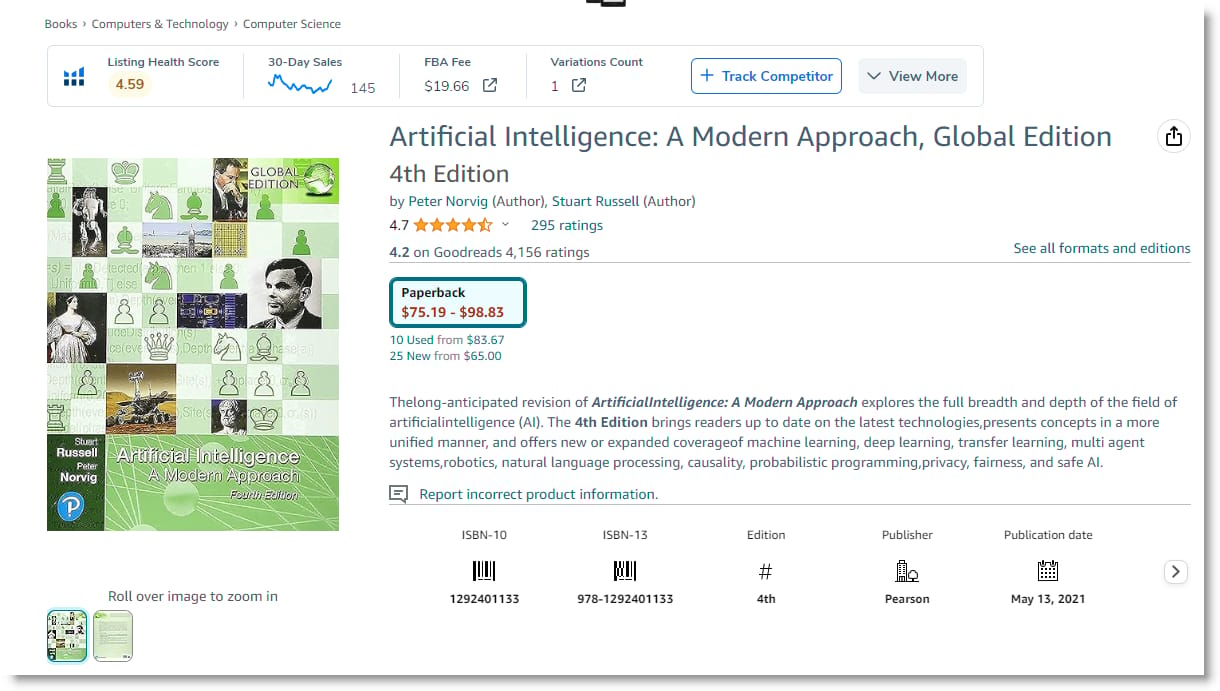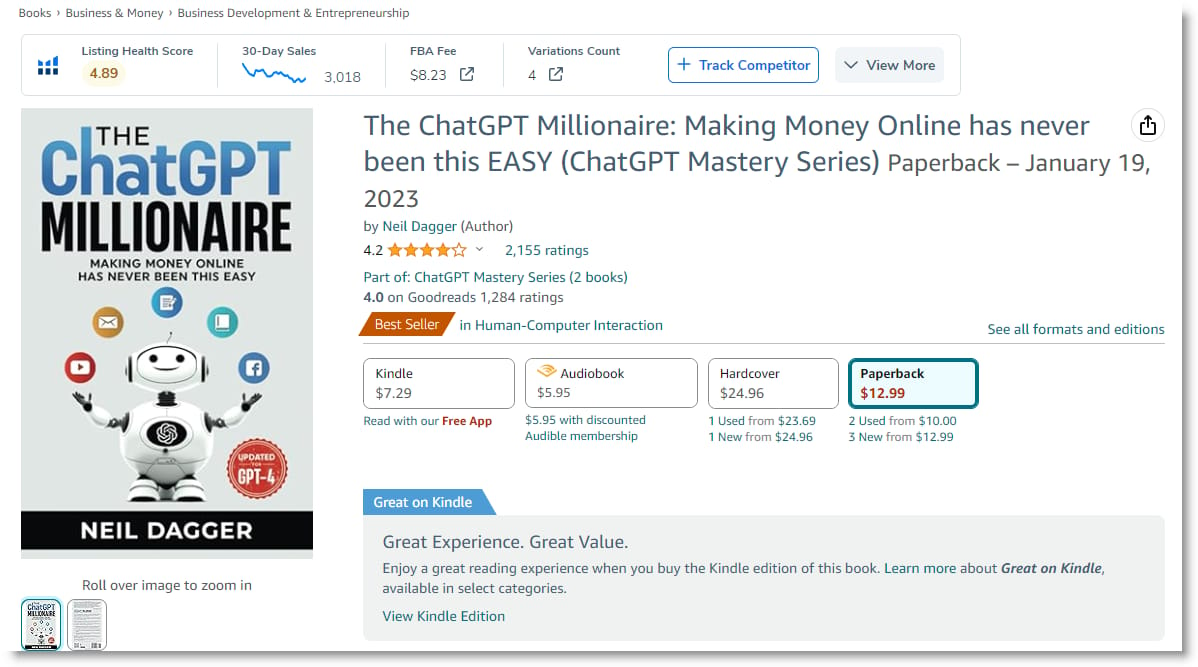The six best selling books on ai each make from $80,000 to $470,000 per year!

Finding Best Selling Books on ChatGPT (image by author)
I have published books that made no sales. I explain my error down below but lets get right into the solution first:
☛ If I want to publish a book that makes sales, I need to know where the best sales are happening.
Here’s what I found after researching over 400 books on ai tools:
➤ I started using Helium 10 to help me find the best selling books about ChatGPT, ai tools and artificial intelligence on Amazon.
This is why:
I don’t want to just write books - I want to write books that earn money.
As is get prepared to write books for Amazon KDP, I want to strive for better earning results than this author who posted:
‘I published 150 books on Amazon KDP and what have I got to show for it?’
It seems that her 150 books are hardly earning $10 each… which is less than my articles are earning on Medium (more on that below). シ
Do Most Books Make No Sales?
My book research collected sales data on over 400 top ranking books on the topics of ai tools, artificial intelligence and chatgpt search phrases.
291 titles had no sales.
42 were nearly related topics and not a match
56 titles registered as having sales in the past month.
Of those books with sales,
26 books earned more than $1000 revenue in the 30 days prior
20 books earned more that $100.

26 books earn more than $1000 per month
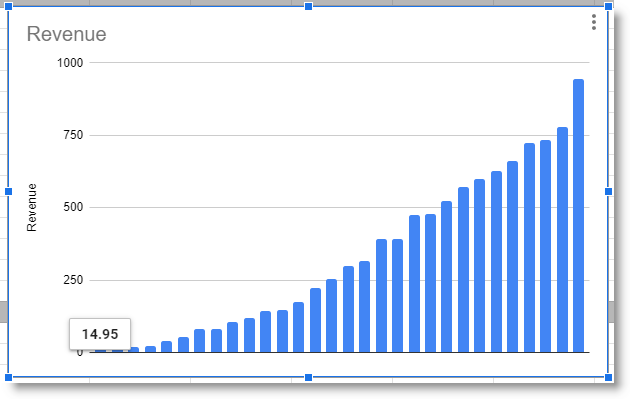
20 books earning less than $1000 per month
Let’s dig into the data of how I used Helium 10 to uncover this powerful list of books that are making sales.
⚑ I want to learn all I can about each of them so that I can plan to write my own book to provide solutions an audience that is already seeking and buying.
From this top list, I’ve compiled a bit about each book and what customer reviews are saying. I’ll share more about my findings but I thought I’d start by highlighting what I found about the 6 best selling books about ai on Amazon.
Six Best Selling Books On AI
Here are six books on Artificial Intelligence that are making estimated revenues from $80,000 to $470,000 per year in sales!
#6. What Is ChatGPT Doing ... and Why Does It Work?
➜ ($6.8k/mo or $81k per year)
Stephen Wolfram's "What Is ChatGPT Doing ... and Why Does It Work?" emerges as a timely and insightful exploration into the mechanics and philosophy behind ChatGPT. Wolfram, renowned for his pioneering work in computation and the genius behind Mathematica and Wolfram Alpha.
The book's strength lies in its ability to cater to both the technically inclined and the layperson.
Early chapters provide simplistic explanations, drawing grounded perspective on how ChatGPT should be approached for general use.
Wolfram generously sprinkles the text with code snippets, illustrations, and examples of the cybernetic neural net that powers ChatGPT. This deep dive into the engine room of the AI not only educates but also marvels at the technological breakthroughs that have been achieved.
However, Wolfram's narrative takes a sharp turn in the latter chapters. After building up the marvel that is ChatGPT, he deconstructs it, laying bare its limitations and flaws. This candid dissection serves as a reminder that while AI has come a long way, it is not without its shortcomings.
The critique challenges readers to reflect on the broader implications of AI and the nature of intelligence itself. One reviewer's interpretation of this section, drawing parallels between ChatGPT's technique and Darwinian evolution, underscores the profound philosophical questions the book raises.
Yet, amidst the technical jargon and philosophical musings, Wolfram's central message remains clear: understanding the billions of processing elements and connections in ChatGPT might be as elusive as grasping the mysteries of human intelligence by merely contemplating the brain's electrochemical complexity.
In conclusion, Wolfram's unique perspective and expertise make this book a must-read for anyone curious about the future of AI and its place in our world.
#5. Artificial Intelligence For Dummies
➜ ($7.6k/mo or $92k per year)
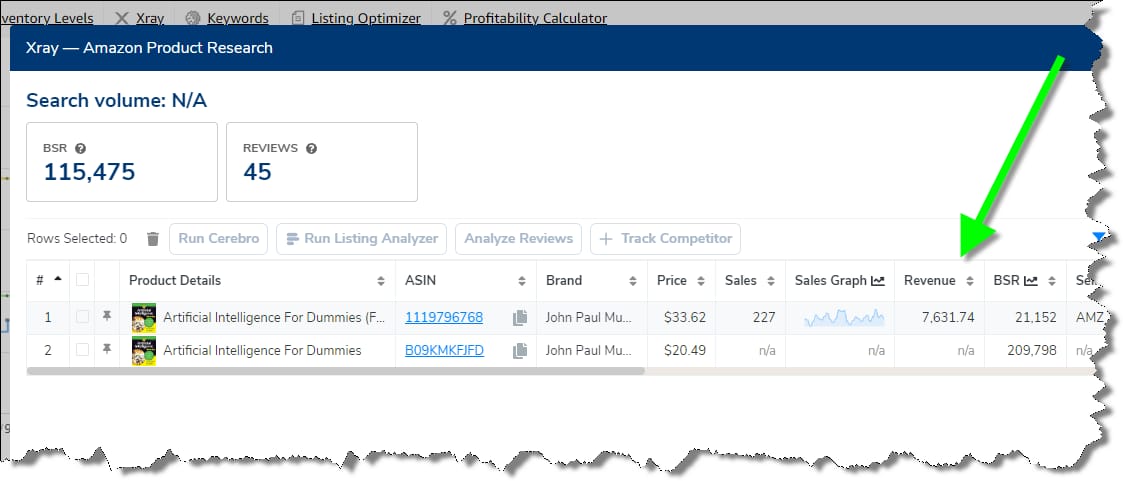
"Artificial Intelligence For Dummies" serves as an introductory guide to the world of AI, aiming to demystify the technology that has seamlessly integrated into our daily lives. The book's description promises a comprehensive overview, from the basics of AI to its applications in various fields. It seeks to bridge the gap between the layperson's curiosity and the intricate details of this rapidly evolving technology.
However, based on the customer reviews provided, it seems the book might not fully deliver on its promise. While the description paints a picture of a guide that will help readers differentiate between AI's reality and its hype, some readers found the content to be generic and lacking depth. A common criticism is the book's outdated nature, which is a significant concern given the rapid advancements in the AI field. A book published in 2021 that doesn't reflect the latest developments can quickly become obsolete.
Another point of contention is the book's length and content structure. At 326 pages, one would expect a comprehensive dive into AI. Yet, some readers felt it was padded with generic information, which detracted from its utility for those genuinely keen on understanding AI.
In conclusion, while "Artificial Intelligence For Dummies" might serve as a starting point for those entirely new to the concept of AI, it may not be the best resource for those looking for an up-to-date, in-depth exploration of the subject. The fast-paced world of AI demands resources that are not only comprehensive but also current, and this book, according to some readers, might fall short in that regard.
#4. Artificial Intelligence: A Modern Approach, Global Edition
➜ ($10.9k/mo or $130k per year)
"Artificial Intelligence: A Modern Approach" stands as a cornerstone in the realm of AI literature. The 4th Edition, with its timely updates, delves into the expansive universe of artificial intelligence, encompassing everything from machine learning and deep learning to robotics and natural language processing. The authors have made commendable efforts to present a unified perspective on AI, ensuring that readers, whether beginners or seasoned professionals, can navigate the intricate tapestry of concepts with relative ease.
The book's structured approach is one of its most laudable attributes. By initiating the discourse with foundational concepts and gradually transitioning to more intricate techniques, it ensures a systematic and comprehensive learning experience. This edition's inclusion of contemporary topics like transfer learning, multi-agent systems, and the ethical dimensions of AI, such as privacy and fairness, makes it a pertinent read in today's rapidly evolving tech landscape.
However, the book's vast scope, while being its strength, can also be its Achilles' heel for some readers. Given its endeavor to cover the gamut of AI topics, certain sections might appear dense or even overwhelming to some. While it offers a robust introduction to various AI subfields, those seeking a deeper dive into specific areas might find the coverage a tad superficial and may need to turn to specialized resources.
In conclusion, "Artificial Intelligence: A Modern Approach" is undeniably a seminal work in the AI domain.
It provides a panoramic view of the field, making it an indispensable asset for anyone keen on or already immersed in the world of AI and machine learning. While it might not satiate the appetite of those seeking exhaustive details on specific topics, it undoubtedly lays a solid foundation upon which further knowledge can be built. A worthy addition to the bookshelf of any AI enthusiast or practitioner.
#3. Generative Deep Learning: Teaching Machines To Paint, Write, Compose, and Play
➜ ($12.6k/mo or $151k per year)
"Generative Deep Learning: Teaching Machines To Paint, Write, Compose, and Play" is a comprehensive guide that delves deep into the world of generative AI, one of the most groundbreaking areas in the tech industry. The book is meticulously crafted to cater to machine learning engineers and data scientists, offering a step-by-step approach to building generative models using Tensorflow and Keras.
The book's strength lies in its structured progression. Beginning with the foundational concepts of deep learning, it gradually introduces readers to advanced architectures like VAEs, GANs, Transformers, and more. Practical applications such as changing facial expressions in photos using VAEs, generating images with GANs, and text generation with GPT are explained with clarity, ensuring that readers not only understand the theory but can also implement it.
One of the standout features of this book is its inclusion of well-sourced and working code examples. These examples, as attested by several readers, are lucidly explained, allowing for a seamless transition from theory to hands-on practice. However, it's worth noting that some readers have faced challenges with compatibility issues and outdated libraries. This suggests that while the book is a treasure trove of knowledge, one might need to be prepared for some troubleshooting when diving into the practical aspects.
The second edition of "Generative Deep Learning" has been particularly praised for its updated content, reflecting the rapid advancements in the field. For those who have been on the journey of understanding generative deep learning, this edition serves as a testament to the book's relevance and the author's commitment to keeping it updated.
"Generative Deep Learning" is a valuable resource for anyone keen on mastering generative AI.
While it assumes prior knowledge of Python, its depth and breadth make it suitable for both beginners and advanced learners. The book not only educates but also inspires by showcasing the immense potential of generative AI and its future trajectory. However, potential readers should be prepared for some hands-on troubleshooting, especially when working with the provided code examples.
#2. How to Fight Artificial Intelligence (AI) (The Citizen's Guide to Fifth Generation Warfare)
➜ ($25.1k/mo or $301k per year)
In an era where technology's rapid evolution often outpaces our understanding of its implications, "How to Fight Artificial Intelligence (AI) (The Citizen's Guide to Fifth Generation Warfare)" emerges as a timely and crucial guide. Penned by Lieutenant General Michael T. Flynn and Sergeant Boone Cutler, both retired from the U.S. Army, this book is a clarion call to the masses, urging them to recognize and respond to the challenges posed by AI-driven psychological programming.
The authors, with their combined experience in intelligence and psychological operations, present a compelling narrative that paints a picture of a world where foreign-born AI-driven psychological programming is weaponized to manipulate minds and foster totalitarian control. While the premise may sound dystopian, the authors argue that this reality is closer than we think, and the consequences of inaction could be dire.
What sets this guide apart is its accessibility. The book is designed for the average person, breaking down complex topics into digestible chunks, aided by easy-to-understand diagrams.
The inclusion of QR codes, which lead readers to up-to-date video perspectives on fifth-generation warfare, is a unique touch, ensuring that the content remains relevant in a rapidly changing landscape.
Customer reviews echo the sentiment that this book is not just a theoretical exploration but a practical guide. Readers appreciate the actionable steps provided to protect themselves and their families from the potential harms of AI.
The emphasis on education and awareness, especially for parents, is a recurring theme in the feedback, highlighting the book's broad appeal.
However, it's worth noting that while the book's urgency is palpable, some might find its tone alarmist. The idea of a "global superstructure" trying to restructure the world might be challenging for some to digest without more concrete evidence. Furthermore, while the book does a commendable job of breaking down the dangers of AI, a deeper dive into the potential benefits and positive applications of AI might have provided a more balanced perspective.
In conclusion, "How to Fight Artificial Intelligence (AI) (The Citizen's Guide to Fifth Generation Warfare)" is a thought-provoking guide that pushes readers to question the role of AI in our lives. Whether you view AI as a tool, a threat, or both, this book offers valuable insights and practical solutions for navigating the challenges of the digital age.
#1. The ChatGPT Millionaire: Making Money Online has never been this EASY (ChatGPT Mastery Series)
➜ ($39.2k/mo or $470k per year)
"The ChatGPT Millionaire" is a timely and insightful guide that delves into the burgeoning potential of leveraging ChatGPT, particularly the GPT-4 model, for online wealth creation. The book promises a step-by-step approach to harnessing the capabilities of this AI model, offering readers a chance to capitalize on a relatively untapped market.
The book's strength lies in its structured layout, starting with an introduction to ChatGPT, its advantages, and then diving deep into practical applications. The inclusion of specific examples, prompts, and responses is particularly beneficial, providing readers with actionable templates they can immediately implement.
The bonus "Act as" prompts and the ChatGPT Prompt cheat sheet further enhance the book's value, serving as handy tools for both novices and those familiar with the technology.
However, as one reviewer pointed out, for those who have been using ChatGPT for a while, the content might not offer groundbreaking insights. This suggests that while the book is an excellent starting point for beginners, seasoned users might crave more advanced strategies or nuanced applications.
On the other hand, the glowing reviews highlight the book's potential to revolutionize online wealth creation. The author's clear and concise writing style, combined with their ability to demystify complex concepts, makes the book a standout in its genre.
The emphasis on real-life success stories and case studies lends credibility to the methods proposed and can inspire readers to envision their entrepreneurial journey.
In conclusion, "The ChatGPT Millionaire" is a commendable effort to bridge the gap between AI technology and online entrepreneurship.
While it might not cater to all levels of expertise equally, its practical approach, combined with actionable insights, makes it a valuable addition to any aspiring online entrepreneur's library. As the world of AI continues to evolve, guides like this will undoubtedly play a pivotal role in shaping the future of online business.
Writing Books That Make Money

The authors lifestyle is a dream for many (image by author)
Dreaming of writing a book? Start with researching what is actually selling within your niche using the Helium 10 Browser Extension for Amazon.
➀ The first step in the process is to find all the books that are making sales.
➁ The second step involves researching the keywords that people are using to find those books when they search on Amazon.
I wasn’t thinking about this at all when I wrote my first books. And the results were predictable. I was in that massive part of the spreadsheet with all those books that made no sales.
My focus was all about me writing my message. I did not look around to find out what kind of message was selling.
In fact, I was intimated or resentful about other peoples success - and that feeling prevented me from learning from the best selling authors.
A Change In Perspective
A pen name may free you from your own limitations.
Adopting a persona can help you separate yourself from your own criticism and fear of rejection.
Check out this article:
Ready To Plan The Next Book
From this starting point, we can now craft an offer that matches our knowledge and interests and build an educational piece that fits this hungry market.
I’ll share my steps as I start with an out line of chapter titles and begin using a collection of AI writing tools to help me craft something original, useful and that is also fact checked.
Stay tuned as we continue the journey to building our newsletter, social media and passive income.
This article contains referral links for some of my absolute favorite business tools for content creators and ai enthusiasts.
If you purchase one of my favorite software tools, I will receive a small commission at no additional charge to you.

